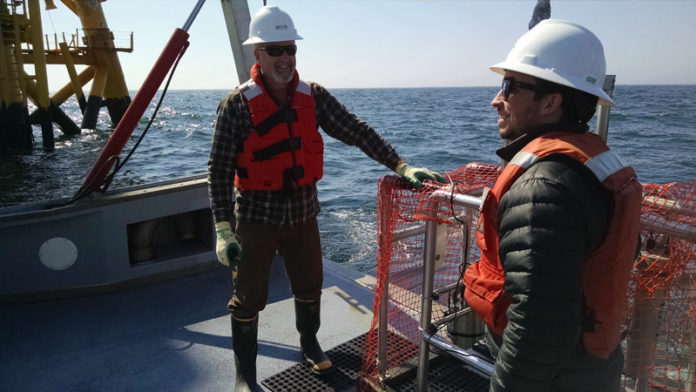
Drew Carey, a Newport-based geologist and ecologist, researches how day-to-day activities of people impact the health of marine wildlife and the ocean floor, and what can be done to maintain a strong underwater ecosystem.
“Our primary purpose is to keep investigating” and help in recovery efforts, said Carey. “I’ve lived in Rhode Island for 25 years, and during that time the condition of Narragansett Bay has improved drastically.”
Now, Carey is the managing partner at INSPIRE Environmental in Newport, an amalgamation of Germano & Associates and CoastalVision LLC. Germano & Associates was based in Seattle and owned by Joe Germano, who joined Carey in Rhode Island and now serves as INSPIRE Environmental’s partner emeritus.
Carey said the pair chose to be headquartered in Rhode Island, with “the intention of growing staff and capabilities. Southeast New England is the best place in the country to operate a marine-technology business.”
Carey said Rhode Island is in the middle of a “tremendous concentration of capability and resources” stretching from New London, Conn., to Woods Hole, Mass., and Boston – home to many startups and research institutes. The company also has a West Coast office, which provides remote support for field work and research expeditions.
INSPIRE uses an underwater-camera technology called SPI, or Sediment Profile Imaging system, designed, in part, by Germano. Carey explained this technology is like “an inverted periscope” and gives a “worm’s-eye view” of sediment lining the bottom of the ocean.
Data collected in these images allows INSPIRE scientists to distinguish trends concerning the health of the sediment.
“It’s a very rapid and inexpensive method for getting that information,” said Carey.
In Rhode Island, INSPIRE uses SPI technology for two purposes. The company surveys sediment removal from the navigation channel in Narragansett Bay by the state and Army Corp. of Engineers, and monitors the impact of the construction of North America’s first operational offshore wind farm, off Block Island.
Carey said he’s already seen “positive aspects” of the wind farm, citing healthy fish life and minimal sea-floor disruption.
He knows the impact of his work is at the center of an increasingly heated global conversation on climate change.
“We’re all scrambling to understand what the future will bring in terms of how the marine ecosystem will work,” he said. “It’s very important to reassure the commercial and recreational fishing community that … competing uses of the ocean are not resulting in any long-term degradation.
“The world of marine science is pretty small,” Carey said, but he wants Rhode Island’s marine technology industry to succeed and that means collaboration.
Carey hopes to continue to grow the company and sees a lot of opportunity in partnering with the oil and gas industry, “as it rebounds from a historic recession.” •










